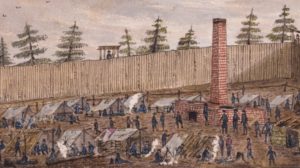At some point in American history, some people began to hide pickles in their Christmas trees. It is a contest of sorts. The idea is that whoever finds that hidden green pickle, camouflaged against the green needles of a Christmas tree, deserves a little something extra. To you, the pickle-finder: you might be blessed with a year of fortune, or you might just have to settle for an extra present on Christmas morning. But it’s a win either way.
There is no agreement as to why there is such a practice of pickle pursuit, though most stories claim it to be a tradition of German origin.
One version of the story revolves around a German immigrant serving as a union soldier during the Civil War. This man found himself imprisoned by the Confederates in the notorious Andersonville Prison Camp. Now, factually the Andersonville Prison camp was awful. Prisoners were woefully under-supplied and conditions were atrocious, so it’s not a stretch to believe that if this man is real, he was starving. Many of the prisoners starved. But this particular man begged his guard for something, anything to eat. He said he’d even settle for something as meager as a pickle.

Being as that it was Christmas Eve, the guard took pity on the hungry German-born Union Soldier and answered his wishes: one delicious Christmas pickle.
Don’t mention it, pal.
Now, for all this hungry German knew, this could’ve been his last meal. So he savored each garlicky, salty bite. But soon he discovered that he found the strength to survive in that green gherkin. At war’s end, when he finally made it back to his family in Pennsylvania, he began the tradition of hiding a pickle in the Christmas tree for his children to scour. It was a way to remember that fateful time in his life, and I guess that guard’s kindness, if you want to call it that.
Still, this alternate story is perhaps a bit more plausible, though still highly doubtful.

In the 1890’s Woolworth’s stores began importing hand-blown glass ornaments from Germany. If you’re unfamiliar, Woolworth’s was once one of the most common stores in the USA and was visited by millions of Americans. Now these glass ornaments they sold to American consumers were shaped as fruits and vegetables; they very well made and desirable at the time. Well, according to legend most of them were desirable. It seems no one wanted the pickle shaped ornaments. That makes sense, right? Who would decorate a Christmas tree with a pickle ornament?
So the brass at Woolworth’s found themselves looking at the tremendous amount of unsold glass pickles ornaments, and they realized what they had to do – convince Americans that they did want pickles hanging from their trees.
Someone with a marketing mind and…. an indifference towards the truth…. made up a story to go along with the pickles: it was an age-old German custom to hide a pickle in the tree for one lucky family member to find. Perhaps it was the power of old-world charm, or our simple and ever-present desire to want the chance at just one more present. The pickles sold, and when next Christmas rolled around they ordered more.
Was this true? Probably not. There is no clear origin of the Christmas pickle practice.
In any case, most sources agree that this is not a tradition ever practiced in Germany. It exists only in America, yet we call it a German tradition.
Was it a German immigrant in the Civil War? Was it a Woolworth’s marketing campaign? Was it something else entirely? We don’t know, but we still like it.
Pickles are funny.
Leave a Reply